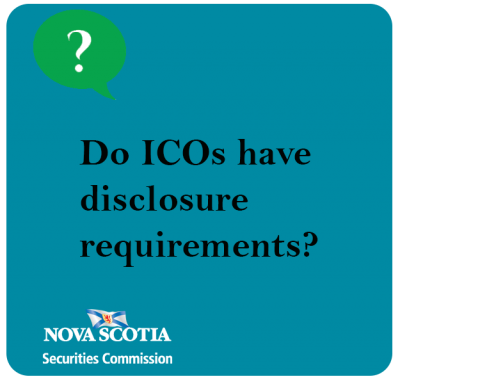Submitted by nsscadmin on

This is a difficult question to answer because most of the time the answer is yes. But, not always. Are we confusing you yet?
Where some people get confused is in thinking that an Initial Public Offering (IPO) and an Initial Coin Offering (ICO) are the same thing, and thus fall under the same regulatory guidelines. However, they’re not the same thing. An IPO, as we’ve previously written about has a number of disclosure regulations that it must follow as instituted by a securities regulator. An ICO may not.
The sticking point with an ICO and disclosure requirement depends upon whether or not it is a security. The SEC announced just last week that they see all ICOs as securities and anyone putting together an ICO must follow regulations. They also cited the Howey Test as to determine whether an ICO is an investment contract and thus a security.
In Canada the CSA provided more guidance with the publication of Staff Notice 46-308. This notice looked at the securities law implication for the offerings of tokens or coins. Every ICO is unique and must be weighed on its own merits to determine if it is a security and falls under Nova Scotia securities laws. To determine if an ICO is an investment contract and thus a security we apply the Howey Test. If the answer is yes, the ICO is a security, then the ICO must provide the disclosures required under securities law. This could include prospectus requirements, registration requirements and other disclosures.
That’s sounds great, but with ICOs being launched around the world at a blistering pace there’s still going to be many that don’t abide by regulations and don’t make the necessary disclosures. There’s also those that won’t because they don’t have to since they’re not securities. In these instances we recommend any investor be cautious. If someone offering an ICO isn’t registered or isn’t providing what should be the necessary disclosure documents that should be a red flag. A few other questions you should think about. Why aren’t they providing that information? If you ask for more information what is their response? If the information is given to you what avenues do you have to make sure it’s legitimate and genuine?
Some of you with more knowledge about ICOs may be wondering about White Papers, and how much disclosure they entail. There’s no one answer to that either. A White Paper should include the location of the people/company launching the ICO, what problem their addressing and their solution, a good description of the coin/token and what it is expected to give the purchaser, the blockchain behind the ICO and the risk factors for the purchaser. If any of this is missing from a White Paper it’s a red flag. If you ask for this information and are denied, this is another red flag.
A White Paper should also be written in plain language that you can understand. If instead you’re getting confusing jargon and explanations you don’t understand this is another red flag.
Even if a White Paper seems legitimate and answers all your questions you still need to be cautious when parting with your money. Anyone can write a White Paper, promising almost anything. There are no regulations surrounding a White Paper. Many fraudulent ICOs have used great looking White Papers to steal people’s money. A white paper is not a prospectus and you may not be receiving full, true and plain disclosures required under securities laws.
As we’ve said many time before, in the wild west that is cryptocurrencies and ICOs, never invest more than you can afford to lose.
